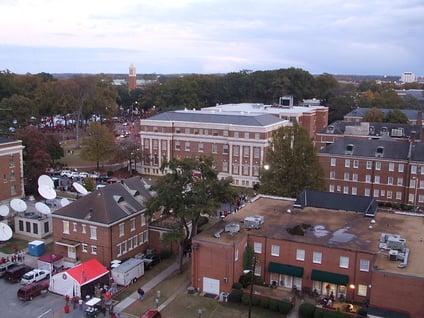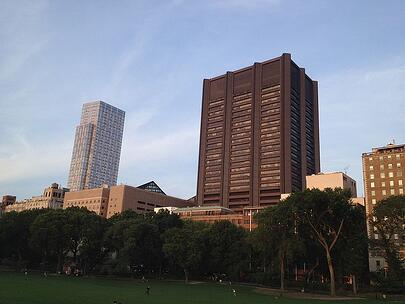Last year, the University of Alabama at Birmingham Comprehensive Cancer Center was awarded a five-year, $29 million grant for the National Cancer Institute. The Cancer Center now receives nearly $6M a year in NCI core funding and will continue to do so through 2021. In addition to this core grant, UAB CCC has received over $8.5M in research funding from the NCI during the first half of 2017. This brings their total NCI funding to $14.5 million.
Read MoreTags: Bioresearch funding, cancer research, Alabama, University of Alabama, Cancer Treatment, Cancer, University of Alabama Birmingham, UAlab, UAB, University of Alabama at Birmingham, Cancer Center, cancer researchers, fight cancer, cancer reserach, Bioresearch Grant, Comprehensive Cancer Center
 (Image courtesy of Wikimedia commons)
(Image courtesy of Wikimedia commons)
University of Alabama at Birmingham received a $29 million grant from the National Cancer Institute. This five year core grant will support six research programs at the UAB Comprehensive Cancer Center. The renewal of the Cancer Center Support Grant, the most prestigious federal grant that a cancer research and treatment program can earn, also extends UAB’s elite “comprehensive” designation. According to the UAB News website this designation is awarded for scientific excellence and the ability to integrate diverse research approaches in the fight against cancer.
Read MoreTags: Bioresearch funding, cancer research, Alabama, University of Alabama, Cancer Treatment, Cancer, University of Alabama Birmingham, UAlab, UAB, University of Alabama at Birmingham, Cancer Center, cancer researchers, fight cancer, 2016, cancer reserach, Bioresearch Grant, Comprehensive Cancer Center

Fighting cancer is a battle that milions of people have had to, or are currently, waging. When surgeons are unable to remove cancerous tumors, radiation treatment (radiotherapy) is used to destroy the tumors. However, many times, radiation treatments fail to destroy the entirety of the tumor, leaving cancerous cells in the body. Researchers at the Ichan School of Medicine at Mt. Sinai in New York have discovered why radiotherapy is not always successful.
Read MoreTags: Mount Sinai School of Medicine, Northeast, New York, MSSM, BioResearch Product Faire Event, NY, fight cancer, radiation therapy, 2016, Icahn School of Medicine, radiotherapy, tisch cancer institute
While today’s advancements in biotechnology suggest that there’s nothing we can’t artificially produce, sometimes there’s just no substitute for nature’s own recipes. At least, that’s the philosophy behind the University of Minnesota’s Schmidt-Dannert Lab, whose aim is to harness compounds created in natural organisms like plants and fungi that cannot be produced by chemical means. Many of these compounds have beneficial properties that can be used in further research and drug production.
For example, take chloroplasts, the organelles that perform photosynthesis inside plant cells. They provide energy to plant cells when exposed to light. Animal cells don’t have chloroplasts, which means they’re missing out on a valuable energy source. The Schmidt-Dannert Lab, led by University of Minnesota professor Claudia Schmidt-Dannert, is working toward is creating solar-powered animal cells that are more productive and produce different sorts of organic materials.
Tags: 2014, Midwest, 2013, University of Minnesota, University of Minnesota St. Paul, Fungi, Minnesota, University of Minnesota Twin Cities, BioResearch Product Faire Event, Funding, Biotechnology, Research, researchers, Minneapolis, lab, MN, Front Line, St. Paul, UMinn, UMinnSP, U-M, fight cancer

